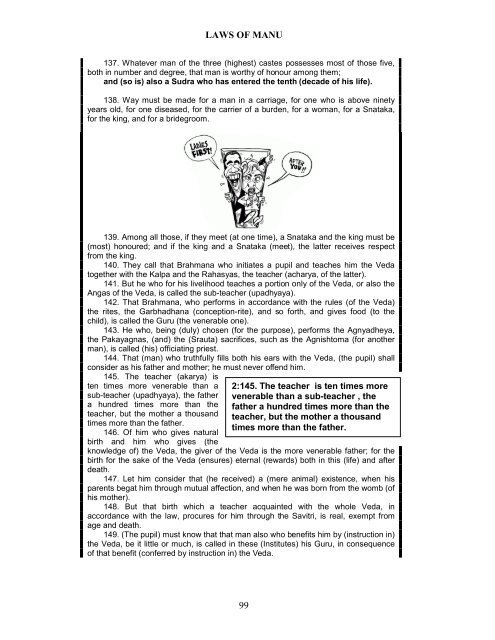You also want an ePaper? Increase the reach of your titles
YUMPU automatically turns print PDFs into web optimized ePapers that Google loves.
LAWS OF MANU<br />
137. Whatever man of the three (highest) castes possesses most of those five,<br />
both in number and degree, that man is worthy of honour among them;<br />
and (so is) also a Sudra who has entered the tenth (decade of his life).<br />
138. Way must be made for a man in a carriage, for one who is above ninety<br />
years old, for one diseased, for the carrier of a burden, for a woman, for a Snataka,<br />
for the king, and for a bridegroom.<br />
139. Among all those, if they meet (at one time), a Snataka and the king must be<br />
(most) honoured; and if the king and a Snataka (meet), the latter receives respect<br />
from the king.<br />
140. They call that Brahmana who initiates a pupil and teaches him the Veda<br />
together with the Kalpa and the Rahasyas, the teacher (acharya, of the latter).<br />
141. But he who for his livelihood teaches a portion only of the Veda, or also the<br />
Angas of the Veda, is called the sub-teacher (upadhyaya).<br />
142. That Brahmana, who performs in accordance with the rules (of the Veda)<br />
the rites, the Garbhadhana (conception-rite), and so forth, and gives food (to the<br />
child), is called the Guru (the venerable one).<br />
143. He who, being (duly) chosen (for the purpose), performs the Agnyadheya,<br />
the Pakayagnas, (and) the (Srauta) sacrifices, such as the Agnishtoma (for another<br />
man), is called (his) officiating priest.<br />
144. That (man) who truthfully fills both his ears with the Veda, (the pupil) shall<br />
consider as his father and mother; he must never offend him.<br />
145. The teacher (akarya) is<br />
ten times more venerable than a<br />
sub-teacher (upadhyaya), the father<br />
a hundred times more than the<br />
teacher, but the mother a thousand<br />
times more than the father.<br />
146. Of him who gives natural<br />
birth and him who gives (the<br />
2:145. The teacher is ten times more<br />
venerable than a sub-teacher , the<br />
father a hundred times more than the<br />
teacher, but the mother a thousand<br />
times more than the father.<br />
knowledge of) the Veda, the giver of the Veda is the more venerable father; for the<br />
birth for the sake of the Veda (ensures) eternal (rewards) both in this (life) and after<br />
death.<br />
147. Let him consider that (he received) a (mere animal) existence, when his<br />
parents begat him through mutual affection, and when he was born from the womb (of<br />
his mother).<br />
148. But that birth which a teacher acquainted with the whole Veda, in<br />
accordance with the law, procures for him through the Savitri, is real, exempt from<br />
age and death.<br />
149. (The pupil) must know that that man also who benefits him by (instruction in)<br />
the Veda, be it little or much, is called in these (Institutes) his Guru, in consequence<br />
of that benefit (conferred by instruction in) the Veda.<br />
99


















